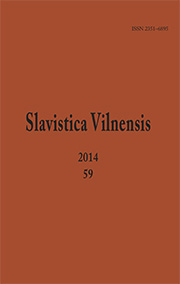Mежславянские семантические заимствования в русском приказном языке ХVII века
Cross-Slavic Calques in the XVIIth Century Russian Cancery Language
Author(s): Liudmila Pavlovna GarbulSubject(s): Semantics, Historical Linguistics, Comparative Linguistics, Eastern Slavic Languages, Baltic Languages, 17th Century, Philology
Published by: Vilniaus Universiteto Leidykla
Keywords: Cross-Slavic language contacts; semantic calque; diplomatic correspondence; the written language of the Great Duchy of Lithuania; “prostaja mova”;
Summary/Abstract: The article examines the history of the following words found in the MXVIIth-cen. Muscovite diplomatic correspondence: verne ‘devoted (to), faithfully’, vol(’)no ‘one may, one is allowed’, gruda ‘frozen clod on the road’, dokonati ‘realize, carry out; fulfill, put into practice’, zaživati ‘use, employ’, zamykati ‘complete, conclude (about speech, text)’, zaperetisja ‘deny, refuse to admit; keep one’s mouth shut’. The author shows that these words, in the meanings provided here, are cross-Slavic calques in the Russian written language of the XVIIth. The author argues that these specific meanings of verne, gruda, dokonati, zamykati, and zaperetisja are most likely calques from Polish, and vol(’)no, zaživati in the examined sense are probably semantic calques from the written language of the Grand Duchy of Lithuania.
Journal: Slavistica Vilnensis
- Issue Year: 59/2014
- Issue No: -
- Page Range: 63-80
- Page Count: 18
- Language: Russian

